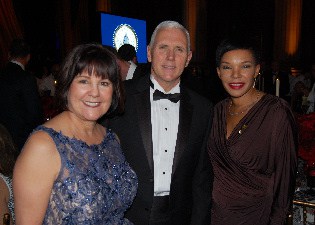At OAS, Prime Minister of Trinidad and Tobago Highlights Challenges of Democracy to Women’s Equality
WASHINGTON, DC – The Prime Minister of Trinidad and Tobago, Kamla Persad-Bissessar, today highlighted at the Organization of American States (OAS) the existing challenges of the democratic system to equality of women in Latin America, emphasizing that the underrepresentation of women in decision-making mechanisms must be addressed “if we truly yearn for that level of democracy which will support and sustain the true economic and social wellbeing of our peoples.”
In a keynote lecture at the First Hemispheric Forum organized by the Inter-American Commission of Women (CIM) of the OAS, UN Women and the Ibero-American General Secretariat, the Trinidadian Prime Minister praised the creation of the Inter-American Democratic Charter a decade ago as an instrument that has promoted and contributed to gender equality and the participation of women in decision making, and thanked OAS Secretary General José Miguel Insulza personally for the initiative to host such an important event.
“In order to carry our democracies forward, to carry our sustainable development, we must have all our human resources, all our talents pulled together, to work forward,” she said.
The Caribbean leader offered an analysis of the achievements of women in political participation in the last decades and of the challenges they still face, and she presented a series of recommendations for progress towards the future. The Forum on “Women’s Leadership for Citizens’ Democracy,” held at OAS headquarters in Washington, DC, between today and Wednesday, April 6, seeks to improve understanding in all regional sectors of the current challenges faced by democratic systems in guaranteeing the exercise of women’s political citizenship.
Among other achievements in women’s participation in political life, Prime Minister Persad-Bissessar highlighted the fact that the Americas have the second largest percentage of women in governments and national parliaments in the world after the Nordic countries. She also said that the percentage of women legislators in the region has jumped 55 percent between 2000 and 2006; that 12 countries in the Americas have adopted gender quotas to increase women’s representation in decision making; that there are more female candidates than ever before in local and national elections, and that women have risen to high-level positions in both the private and public sectors. In light of these facts, she said, “Today women are more ambitious, more competitive, and are motivated not only by an interest in promoting women’s issues and concerns but by the socio-economic well being of the society more broadly.”
She subsequently explained that to make these motivations a reality, women must work to avoid being limited to filling positions related exclusively to women’s issues. “We need to be able to represent non-gender concerns and we need to gain access to traditionally male dominated political arenas. And this is where women have had the most difficulty in recent years,” she said.
The Prime Minister of Trinidad and Tobago also mentioned the need to continue to change the mentality of men who feel threatened when women succeed in developing their intellectual and leadership abilities. “As women progress further, as women come into the legislatures, as women move into high-profile positions, our male counterparts may feel threatened. But more and more that perception is also changing,” she asserted.
The Caribbean politician said that in her country, women already represent 27 percent of the parliament and 26 percent of decision makers appointed to state boards. In this sense, she recalled her government’s commitment with gender equality through national initiatives, but also through regional and global systems, and mentioned specially the role it will continue to play in the Inter-American Commission of Women. “We believe that broadening the understanding of women’s roles in the attainment of sustainable peace, and recognizing the value of women’s contribution in this important field is vital,” she said.
Finally, the Prime Minister offered forum participants a few recommendations to move forward towards full equality: to prioritize women’s education and their economic independence; to adopt effective agenda gender quotas, a key tool in increasing the number of women in office; to decrease advantages for political incumbents to lift obstacles that keep women from entering the political arena; to create training and educational programs to motivate women to get involved in politics; and to sensitize the public on gender policies, as well as create awareness through educational programs.



